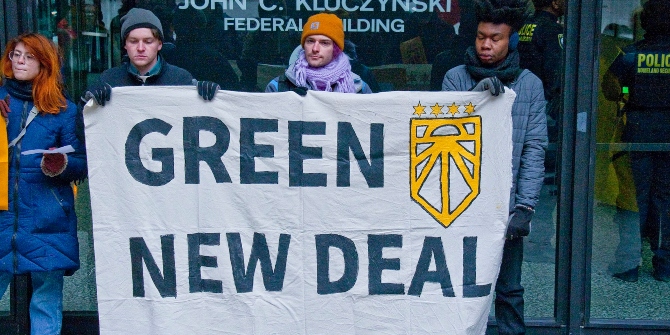
Watching the impactful images of San Francisco turned red by unprecedented wildfires was a reminder of how climate change must be reversed fast. At the same time, the coronavirus crisis has led to millions of job losses, bringing the economic recovery to the political fore. Politicians are framing Green Deals as the silver bullet to kill two birds with one stone.
Democratic candidate Joe Biden announced a $2-trillion ‘Green New Deal’ plan designed to boost the economy, while also tackling climate change. The proposal surely took note of what was happening on the other side of the Atlantic, where the European Commission (EC) president, Ursula von der Leyen, had launched Europe’s Green Deal (EGD) in December, framing it as a “new growth strategy”, and later used it to shape the European post-Covid-19 recovery.
Some economic commentators and climate pundits have recently been questioning how much green deals can be a growth strategy. Rather, they should be seen as necessary to avoid catastrophic scenarios, but harmful to the economy, at least in the short term given transition costs. Potentially, they could also be economically damaging in the long term, by making a country’s products uncompetitive on the world market.
Can the EGD foster Europe’s prosperity in a sustainable way and, in so doing, serve as an inspiration for the rest of the world? For this to happen, the path is narrow, and several policy planks must come together like the pieces of a puzzle.
In brief, the growth strategy should be to make Europe the leader in, and provider of, green technologies worldwide. The EU would then benefit from being an early adopter, developing important economies of scale that would make European green technologies a production standard around the world. Several policy tools are needed to support this economic strategy, and aim to reinforce its probability of success.
First, regulation and taxation must be deployed to force or prod producers to shift away from polluting goods and production processes, towards the green economy. For example, zooming in on one sector such as automotive, regulation such as toughening emissions standards or taxing gasoline will set up the incentives for producers and consumers to shift progressively towards hybrid or full-electric cars. The latter are currently starting to receive important subsidies (which are effectively negative taxation) as part of Covid-19 recovery plans, such as in Germany and France. For other items, such as single-use plastic, an outright regulatory ban will come into force in 2021, again to push rapidly producers to re-invent these business lines in a more sustainable way.
Second, an active industrial policy should accompany the green transition in two ways. On the offensive side, to help kickstart research or production in certain sectors, overcoming initial fixed costs or path dependencies. Continuing along the example of car production, this could include electric car battery production or R&D on hydrogen. On the defensive side, while safeguarding FDI and healthy business cooperation, industrial policy should prevent foreign companies from extracting and expatriating the technological edge from EU firms, therefore frustrating the effect of the offensive side of industrial policy. Moreover, it should ensure that EU firms are not outcompeted by foreign entities that are benefitting from extensive state support at home. If we take the view that the green transition is expected to be a new industrial revolution, it is important to note that in the early stages of industrial revolutions, governments have generally taken an active stance to support their home-grown industry to ensure their edge, as illustrated by Sven Beckert when analysing the origins of the cotton industry.
Third, a Carbon Border Tax (CBT), offering privileged access to the large European market to greener products, should play a key role in the EGD green growth strategy, through two main functions. First, and more evidently, it would temporarily ensure that while Europe embarks on the green transition, and economies of scale have not realised yet, EU firms are not outcompeted by cheaper, but more polluting, products from abroad. Second, and equally important, a CBT would be a tool to spread the green transition beyond Europe’s borders. The EU is directly responsible for roughly 10% of global greenhouse gas emissions, implying that even achieving a climate-neutral continent will hardly stop climate change unless other countries follow. A CBT is a tool to prod foreign companies to accelerate their green transition. This is crucial not only from the climate point of view, but also for the economic strategy to succeed, as it will create demand for (European) green technologies abroad.
Just like a CBT, trade policy and foreign aid can help set up incentives for third countries to accelerate on their green transition. For example, it has been proposed that all future trade deals with the EU must contain commitments to climate action. Likewise, foreign aid, of which Europe is the largest provider worldwide, can be linked more or less directly to new green infrastructure and action, as suggested by Paul Collier.
This economic strategy naturally entails some risks. For example, the EU could succeed in achieving a green technological edge, but still fail to reap the global industrial benefits. This has happened before, for example in the case of solar panels at the turn of the century. While Europe, and Germany specifically, developed advanced technological knowhow for photovoltaic panels, also thanks to important government subsidies for adoption, much lower production costs in China meant that the economic benefits to a large extent failed to materialise.
At first sight, the goal might look daunting. And yet, the only way to make climate mitigation a success is to make it also palatable to the electorate. And for this to happen, it must be a greening strategy that goes hand in hand with economic prosperity. In the end, paraphrasing John F. Kennedy, “we choose to go to the moon, not because it is easy, but because it is hard, because that goal will serve to organise and measure the best of our energies and skills”.
Author’s disclaimer: The opinions here expressed are those of the author and do not necessarily represent those of the institution to which he is affiliated.
♣♣♣
Notes:
- This blog post expresses the views of its author(s), not the position of LSE Business Review or the London School of Economics.
- Featured image: Chicago Sunrise Movement Rallies for a Green New Deal Chicago Illinois 2-27-19 6317, by Charles Edward Miller, under a CC-BY-SA-2.0 licence
- When you leave a comment, you’re agreeing to our Comment Policy






I agree with much of what you say Alessio but I think you unconsciously minimize the problems associated with the necessary changes to ensure that our children and grandchildren have a chance of liveable lives on our planet if you do not also consider the need to move from the measurement of human progress through the GDP prism.
It is to my mind, having studied the science, incontestible that the negative societal and economic effects of climate change are not linear but exponential and that the problems will multiply as we pass the tipping points that change crucial eco-systems in the next few decades. So talking about GDP is at best simply asking the band to play a different tune as the Titanic sinks – in terms of its relevance to staying within the CO2 limits necessary for human survival soon after the end of this century.
We need a totally different economic model that does not encourage economic growth because the more extraction of resources from the earth that occurs the more we wreck our planet. The more we travel, the more that we farm for meat and dairy production, the more that we needlessly consume high technology products, the more that we force agricultural land to “increase productivity” using powerful chemicals that destroy pollinating species, then the quicker we bring on our climate destruction armageddon.
I would ask you to consider whether the whole series of premises that you have built your career on as basically a product of modern neo liberal economic theory is redundant and totally unsuited to the needs of the coming decades. The notion that generals always fight the next war with the concepts and weapons of the last comes to mind here.
Your reasoning is correct if one assumes a large enough margin to continue polluting. But that margin is simply not there anymore. Swapping fossil cars for electric ones (swapping highly polluting and resource intensive goods for somewhat less polluting equivalents) while maintaining a lifestyle of high material consumption will not be enough to avert catastrophe. Unpalatable but true.